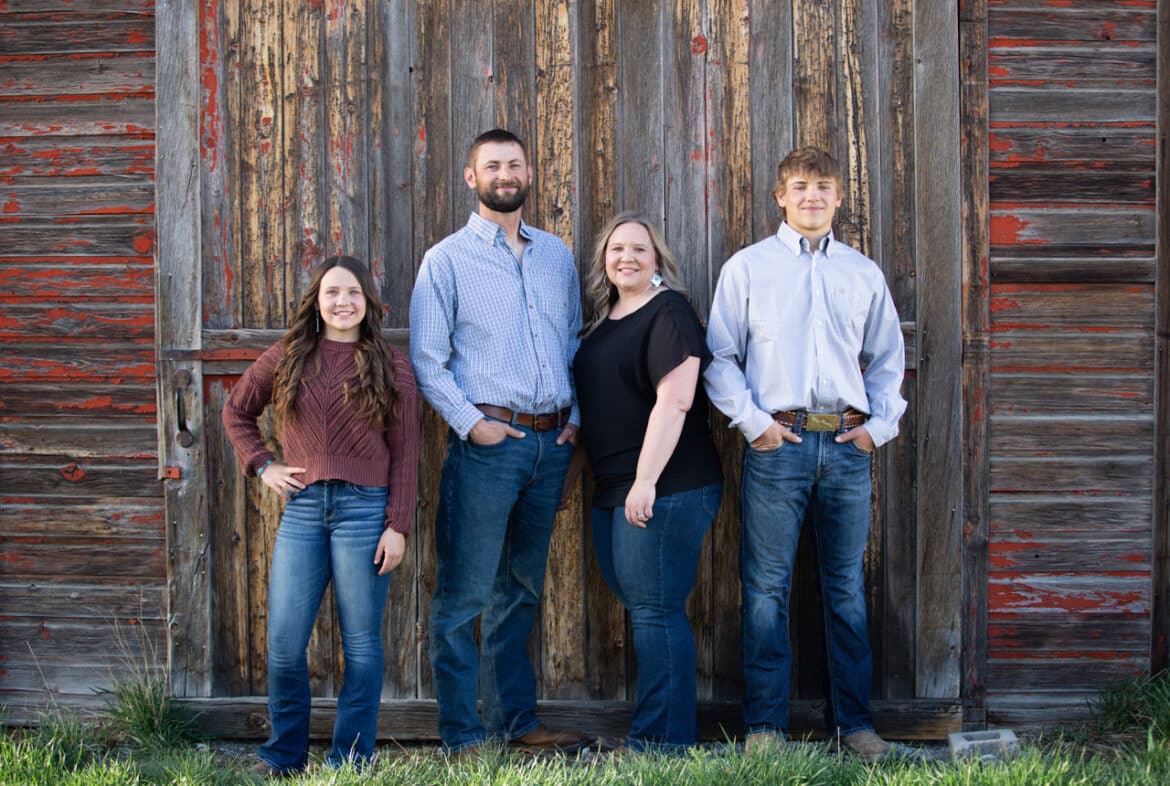Kurt and PJ Myllymaki of Stanford are the 2023 recipients of the Montana Leopold Conservation Award®.
Given in honor of renowned conservationist Aldo Leopold, the prestigious award recognizes farmers, ranchers, and forestland owners who inspire others with their dedication to land, water, and wildlife habitat management on private, working land.
Sand County Foundation and American Farmland Trust present the award in Montana with the Montana Department of Natural Resources and Conservation, and the Rangeland Resources Committee.
Kurt and PJ are farmers and ranchers from Judith Basin County who utilize cover crops to graze their beef cattle and prevent soil erosion. The Myllymakis receive $10,000 and a crystal award for being selected. Earlier this year, Montana landowners were encouraged to apply (or be nominated) for the award. Applications were reviewed by an independent panel of agricultural and conservation leaders.
Among the many outstanding Montana landowners nominated for the award were finalists Goggins Ranch of Ennis in Madison County, and Peterson Angus Ranch of Drummond in Granite County. Last year’s recipient was Pete and Meagan Lannan’s Barney Creek Livestock of Livingston in Park County.
The Montana Leopold Conservation Award is made possible through the generous support of American Farmland Trust, Montana Department of Natural Resources and Conservation, Rangeland Resources Committee, Sand County Foundation, Sibanye-Stillwater, AgWest Farm Credit, USDA Natural Resources Conservation Service, C Lazy J Livestock Inc., Ducks Unlimited, Grazing Lands Conservation Initiative, McDonald’s, Montana Farm Bureau Federation, Ranchers Stewardship Alliance, Soil and Water Conservation Society, Western Sustainability Exchange, and World Wildlife Fund.
“These award recipients are examples of how Aldo Leopold’s land ethic is alive and well today. Their dedication to conservation shows how individuals can improve the health of the land while producing food and fiber,” said Kevin McAleese, Sand County Foundation President and CEO.
“As the national sponsor for Sand County Foundation’s Leopold Conservation Award, American Farmland Trust celebrates the hard work and dedication of the Montana recipient,” said John Piotti, AFT President and CEO. “At AFT we believe that conservation in agriculture requires a focus on the land, the practices and the people and this award recognizes the integral role of all three.”
In his influential 1949 book, A Sand County Almanac, Leopold called for an ethical relationship between people and the land they own and manage, which he called “an evolutionary possibility and an ecological necessity.”
Sand County Foundation and American Farmland Trust present the Leopold Conservation Award to private landowners in 27 states with a variety of conservation, agricultural and forestry organizations. For more information on the award, visit www.leopoldconservationaward.org.
ABOUT KURT & PJ MYLLYMAKI
Wind has been called an “untamed beast.”
It’s something farmers Kurt and PJ Myllymaki know all too well. The Myllymakis raise crops and cattle on central Montana’s brittle, drought-prone landscape. An uptick in high and sustained winds convinced them to change their farming and grazing practices to save their soil from erosion.
Winds still blow, but soil erosion has been eliminated by keeping a continuously-growing cover on their grazing and cropland. Cover crops are just one of the conservation practices the Myllymakis have adopted in the past few years to make their farm more environmentally and economically resilient.
They adhere to the five principles of soil health on their 5,300 acres of cropland: keep soil covered, increase plant species diversity, keep a living root in the soil as long as possible, minimal soil disturbance, and livestock integration.
No matter the season, their fields continuously grow oats, barley, chickpeas, flax, lentils, winter and spring wheat, yellow and green peas, or a mixture of cover crops. The crop rotation’s diversity reduces the potential for crop diseases, improves the exchange of nutrients in the soil’s biology, and attracts beneficial insects and pollinators. As a result, the Myllymakis have also been able to decrease their use of synthetic fertilizers, herbicides, insecticides, and fungicides, without harming crop yields.
By striving to mimic natural processes, the Myllymakis are seeing a variety of environmental benefits. Wildlife populations, from antelope to pheasants, have increased thanks to the improved habitat and winter cover. Since switching to a no-till system on their crop fields, the Myllymakis have noticed more worms and dung beetles, which help cycle nutrients in the soil. Dung beetles and other insects are also no longer harmed by an insecticide product the Myllymakis stopped using on their cattle to control flies.
One of the first changes the Myllymakis made was moving their calving dates for their 250 cows from February to mid-May. The move benefitted the herd’s health and reduced the need for supplemental hay. A switch to a regenerative grazing system across 3,300 acres has led to healthier grasslands with greater species diversity and higher plant populations.
While windy, their region receives little snow, which allowed a switch to a year-round grazing system in 2016. Eliminating costs and labor associated with hay production made economic sense. Limiting their cattle’s access to the riparian area along the Wolf Creek has resulted in the regeneration of willow trees and greater wildlife habitat.
The Myllymakis have increased their farm’s resiliency to drought thanks to conservation practices. Diversifying their soil’s biology increases its ability to infiltrate water. Now valuable moisture seeps into their soil, while it runs off of fields elsewhere.
Kurt and PJ are quick to credit a Ranching for Profit workshop and technical assistance from the Natural Resources Conservation Service for their farm’s turnaround. They also are thankful for the role family has played. Kurt’s father Bruce has always been open to trying new things. Their children, Kameron and Kady, are developing their own conservation ethic when moving cattle and checking crop and soil conditions.
No longer fighting the winds of change, the Myllymakis are a model for others to emulate. They admit the transition wasn’t easy, but they tamed the beast.
###
Sand County Foundation


